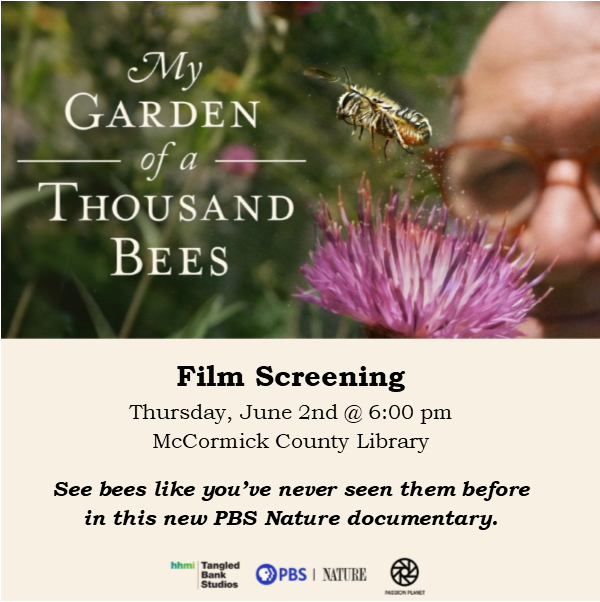The McCormick County Library is excited to host an all-ages, free screening of My Garden of a Thousand Bees on Thursday, June 2nd at 6 pm. See bees like you’ve never seen them before in this 1 hour PBS Nature documentary. Locked down during the coronavirus pandemic, acclaimed wildlife filmmaker Martin Dohrn set out to record all the bee species in his tiny urban garden in Bristol, England. Filming with one-of-a-kind lenses he forged at his kitchen table, he catalogues more than 60 different species, from Britain’s largest bumblebees to scissor bees the size of mosquitoes. Over long months, Dohrn observes how differences in behavior set different species apart. He eventually gets so close to the bees he can identify individuals by sight, documenting life at their level as it has never been seen before.
“We are pleased to offer this My Garden of a Thousand Bees screening as part of the nationwide #PlantWildflowers campaign,” said Paul Brown, McCormick Library Director. “HHMI Tangled Bank Studios and PBS Nature launched the #PlantWildflowers campaign to encourage communities across the U.S. to better understand the importance of native bees and other pollinators and to create new pollinator habitats where pollinators can thrive. With help from the McCormick Garden Club, we have planted two pollinator gardens at the library this month.”
Bees and other pollinators play a crucial role in nature, pollinating fruits, vegetables, grains, and flowers that are essential to both human agriculture and wild ecosystems. But these important pollinators are facing challenges from habitat and food supply decline, pesticides, and more. The film shows the beauty and biodiversity of native bees and how to support these important local pollinators.
“We hope this film astonishes and delights audiences as they watch never before seen footage documenting the daily lives of different species of bees, said Dr. Sean B. Carroll, Head of HHMI Tangled Bank Studios. “And we want everyone who sees this film to realize that wherever they are, they can make a difference for native bees like the ones in the film by planting their own pollinator-friendly wildflowers.”
Light refreshments will be served and attendees will receive free packets of wildflower seeds native to the southeast.

